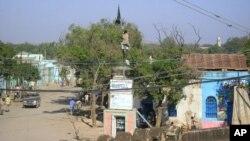Ethiopian and Somali soldiers seized control of the town of Baidoa in central Somalia this week, driving al-Shabab militants from one of their major strongholds. But analysts say the strategic victory carries significant risks.
Ethiopian forces working alongside troops from Somalia's Transitional Federal Government, TFG, met very little resistance on the road to Baidoa.
Empty town
TFG field commander Adan Ahmed Omar told VOA his forces fought a series of small battles on the way to Baidoa, killing 12 al-Shabab fighters and capturing five. He says the town was empty by the time they got there.
Omar said his forces have now liberated the Bay and Bakool regions of central Somalia, with the exception of a few districts.
The victory in Baidoa also opens up a pathway to the biggest al-Shabab stronghold, Kismayo -- a port city in the southeast controlled by the militants, and a major transit point for guns and money.
Baidoa, too, was an important strategic operating base for the militants.
"Major victory"
Once the seat of the former transitional federal government, and a major trading center, al-Shabab took control of Baidoa in early 2009. The city also hosts an international airport big enough to land cargo planes that could be used to bring in weapons, supplies and soldiers.
Rashid Abdi, an independent Horn of Africa analyst, says capturing Baidoa is a "major victory," but that the work is not finished.
"The fact that it has now reverted back to TFG control I think is hugely significant, but the problem, again, is how to really create a legitimate credible administration in Baidoa which will be acceptable to the people. I think that will be more important than the military victory itself.”
Mistrust
Somalis are also sensitive about Ethiopia's role, fighting alongside the TFG, because of the country's history.
In 2006, Ethiopian troops invaded Somalia in a successful drive to overthrow an Islamist government that briefly controlled Mogadishu.
But the invasion increased popular support for al-Shabab, and its campaign to defend the sovereignty of Somalia against foreign forces. A little more than two years later, Ethiopia withdrew.
Rashid Abdi says it is essential for Ethiopia to leave quickly, but he is unsure that the TFG or the African Union's force in Somalia, AMISOM, have the capability to provide security on their own.
"So if that is the case, it will mean that Ethiopians will have to stay for some time. And the longer they stay in Somalia, the greater the risk of a public backlash and I think the Ethiopians are very much aware of that problem," he said.
Challenges along with victory
The transitional government has struggled to establish government in towns and villages reclaimed from al-Shabab.
In the southern towns recently seized by Kenyan Defense Forces, the TFG has empowered local, allied militias to keep the peace and administer some sort of law and order.
But infighting and inter-clan rivalries that have stymied all attempts at peace in Somalia for the past 20 years, continue to a pose a threat to these fragile political alliances.















